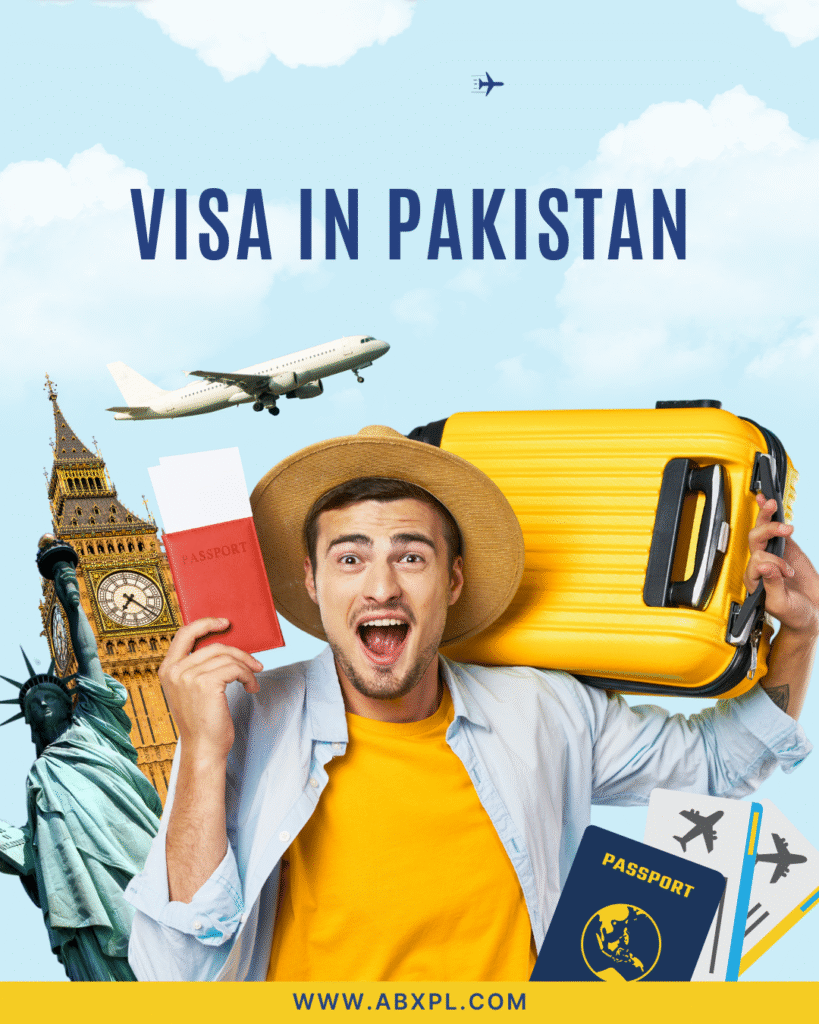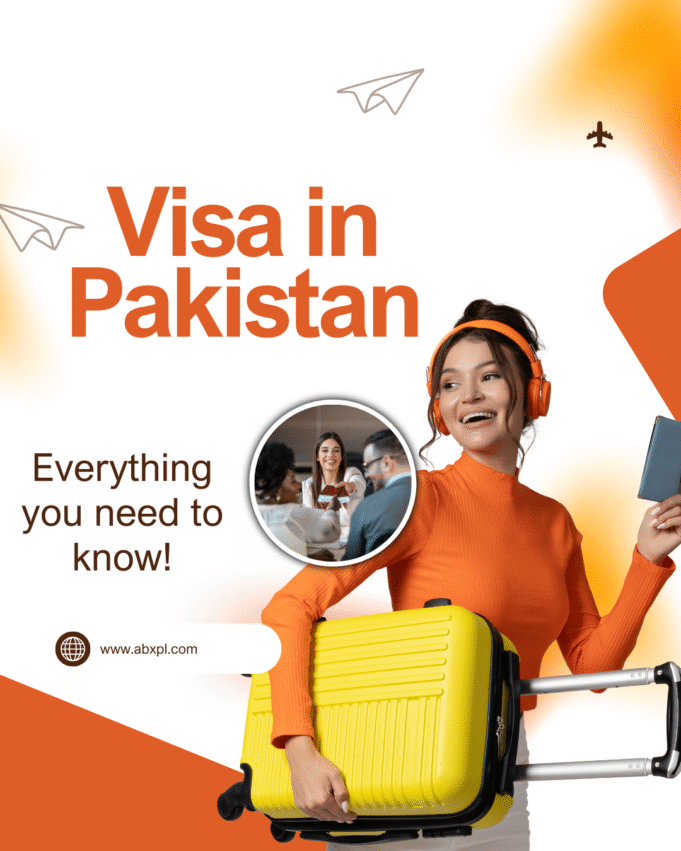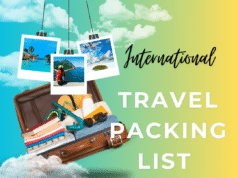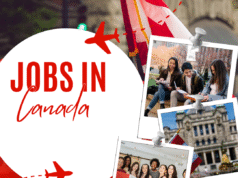Traveling to Pakistan has become one of the most rewarding adventures for globetrotters in recent years. With its towering Himalayan and Karakoram ranges, centuries-old forts, colorful bazaars, and warm hospitality, Pakistan has been named among the world’s top emerging travel destinations. But before you can immerse yourself in the vibrant culture of Lahore, trek to Fairy Meadows under the shadow of Nanga Parbat, or enjoy street food in Karachi, there is one important step every traveler must take: securing a visa in Pakistan.
A visa in Pakistan is more than just an entry stamp—it is your key to unlocking a world of unique landscapes and cultural treasures. Whether you are a backpacker planning to cross the Karakoram Highway, a student joining a Pakistani university, a business professional exploring new markets, or simply a curious traveler seeking authentic experiences, understanding Pakistan’s visa policies will help you start your journey on the right foot.
Over the past few years, the Government of Pakistan has worked hard to make entry easier for international visitors. With the introduction of the online e-Visa system and simplified requirements, applying for a visa in Pakistan is now far more convenient than it used to be. In fact, nationals from over 190 countries can apply digitally, and citizens of 126 countries are eligible for a free tourist e-Visa valid for up to 90 days. This modernization not only saves time but also aligns Pakistan with global tourism trends, ensuring more travelers can access the country’s stunning destinations without unnecessary bureaucracy.

But just like planning a trek in Gilgit-Baltistan or a culinary tour through Lahore, applying for a visa in Pakistan requires preparation. There are different visa categories—tourist, business, student, work, and even special permits for mountaineering expeditions. Each has its own rules, documents, and fees. For example, a simple tourist visa may only cost around USD 60, while professional or multiple-entry permits can be higher. Knowing the right category, expected costs, and typical processing times will not only save you stress but also allow you to plan your travel itinerary with confidence.
In this comprehensive guide, we will cover everything you need to know about getting a visa in Pakistan—from eligibility and online application steps to fees, extensions, and travel anecdotes that bring the process to life. You’ll also find practical tips on packing, cultural etiquette, and navigating restricted regions. Whether your intent is leisure, study, or business, this post has been carefully designed to answer the most common questions travelers ask when preparing for Pakistan.
This blog is also optimized for today’s digital readers, which means you’ll find clear headings, FAQs, and links to official resources like the NADRA Visa Portal as well as internal guides from ABXPL Travel Blog to help you with everything from packing lists to destination insights. The goal is to give you a user-friendly, SEO-optimized, and AdSense-compliant resource that ensures you spend less time worrying about documents and more time enjoying your trip.
So, if you’ve ever wondered How do I get a visa in Pakistan? What are the latest Pakistan visa requirements in 2025? How much does a Pakistan tourist visa cost? —you’re in the right place. Keep reading, because this detailed guide will not only walk you through the visa process step by step but also inspire your next adventure in one of Asia’s most exciting destinations.
Understanding Visa in Pakistan: Types & Eligibility
Pakistan has modernized its visa system significantly in the past few years, making it easier for travelers from around the world to visit. The introduction of e-Visa platforms and free visa options for dozens of countries has opened doors for global tourism.
Tourist Visa in Pakistan
Tourist visas are the most common for visitors. These can be single-entry or multiple-entry, valid typically for 30 to 90 days. In 2024, Pakistan launched an upgraded online e-Visa system that allows applicants from over 190 countries to apply digitally.
- Eligibility: Most travelers are eligible for an e-Visa, provided they have a valid passport, return ticket, and proof of accommodation.
- Processing: Usually takes 7–10 working days.
- Validity: 30 days (single entry), extendable up to 90 days.
- Special note: As of mid-2024, nationals from 126 countries can receive a free tourist visa online within 24 hours, valid for a 90-day stay (source).
Business Visa in Pakistan
Business visas are valid for professionals attending meetings, conferences, or trade exhibitions.
- Duration: Up to 5 years with multiple entries.
- Requirement: An invitation letter from a Pakistani company or chamber of commerce.
- Processing: Around 2 weeks.
- Fees: Typically PKR 15,000–30,000 (~USD 50–100), depending on nationality.
Work Visa in Pakistan
For those seeking employment in Pakistan, a work visa is essential.
- Requires a confirmed job offer and approval from the Ministry of Interior.
- Usually granted for one year, renewable.
- Fees vary depending on job type and sponsoring employer.
Student Visa in Pakistan
If your plan is to study Urdu, Islamic history, or join a university program, you’ll need a student visa.
- Requirements: Admission letter from a recognized Pakistani institution, financial proof, and security clearance.
- Validity: Duration of study program (often 1–4 years).
Journalist Visa in Pakistan
Journalists require special permissions to report inside the country.
- Includes travel restrictions to sensitive regions.
- Requires an assignment letter from media house and clearance from government authorities.
Visa on Arrival (VoA)
Travelers from select countries can apply for a Visa on Arrival (VoA). However, this isn’t as widely available as the e-Visa system.
- Pre-condition: Applicants must first register for an Electronic Travel Authorization (ETA) at least 48–72 hours before travel.
- Eligible visitors: Business travelers and tourists from around 50 countries.
- Registration: Mandatory with police in certain areas.
Visa Exemptions
Some travelers are exempt from needing a visa in Pakistan:
- Holders of diplomatic or official passports from specific countries.
- Citizens of Nepal and Maldives.
- UN passport holders.
- GCC nationals with valid residence permits (limited stay).
How to Apply for a Visa in Pakistan
Thanks to the NADRA Online Visa Portal, applying for a visa in Pakistan is straightforward. Here’s a step-by-step guide:
Step 1: Register Online
Head to NADRA’s official portal. Create an account with your email and set a password.
Step 2: Choose Visa Category
Select the type of visa: tourist, business, work, student, or journalist.
Step 3: Fill Application Form
Provide details including:
- Personal info (name, nationality, passport number).
- Travel details (entry/exit points, accommodation).
- Supporting documents (passport copy, recent photo, invitation letter if needed).
Step 4: Pay Fees
Visa fees vary. For example:
- Tourist visa: USD 60 (PKR 9,000 approx.)
- Business visa: USD 80–120 (PKR 15,000–20,000).
Some categories (like e-Visa for selected nations) are free.
Step 5: Submit & Wait
Processing usually takes 7–10 days. Emergency requests may be faster.
Step 6: Receive Approval & Travel
Once approved, download your e-Visa PDF and carry a printout during travel.
Fees & Processing Times for Visa in Pakistan
The cost of a visa in Pakistan depends on nationality, visa type, and duration.
- Tourist visa (single entry): USD 60 (~PKR 9,000).
- Tourist visa (multiple entry): USD 100 (~PKR 15,000).
- Business visa (multiple entry): USD 120 (~PKR 20,000).
- Student visa: USD 50–100 depending on program length.
- Journalist visa: Often free, but highly regulated.
- Special trekking/mountaineering permits: USD 8–120 per person.
Processing time:
- e-Visa: 24 hours–10 days.
- Regular visa: 2–3 weeks.
- Extension: 7 days.
Real Traveler Stories & Experiences
When you apply for a visa in Pakistan, the experience goes beyond paperwork. Here’s an example:
“I applied for my e-Visa on January 5th. By January 12th, it was approved. Arriving in Islamabad was smooth, and immigration staff were welcoming. With my visa secured, I traveled north to Hunza. Crossing the Karakoram Highway was breathtaking—snowy peaks above me, valleys below. The visa process felt like the easy part compared to the adventure that awaited.”
Another traveler recounted delays:
“My business visa took two weeks, but the wait was worth it. I closed deals in Karachi’s trade hub and spent weekends exploring Lahore’s Badshahi Mosque.”
These voices remind us that while the visa in Pakistan process requires patience, the reward is priceless.
Exploring Pakistan After Getting Your Visa
Once you’ve got your visa in Pakistan, the country is your playground.
Northern Valleys
Hunza, Skardu, and Fairy Meadows are some of the most stunning destinations in Asia. Trekkers head for K2 Base Camp, while photographers chase reflections of Rakaposhi.
Cultural Cities
- Lahore: Known for its Mughal architecture, street food, and the Wagah border ceremony.
- Islamabad: Modern city with clean boulevards and Faisal Mosque.
- Karachi: The economic hub with beaches and colonial buildings.
Cultural Experiences
Don’t miss:
- Eid festivals in urban centers.
- Sufi shrines and qawwali nights.
- Pashtun hospitality in Peshawar.
(External reference: Pakistan Travel Blog – Visit Visa)
Extending Your Visa in Pakistan
If your adventure runs longer than planned, you can extend your visa.
- Apply online via NADRA or visit a local immigration office.
- Fees: USD 30–70 depending on type.
- Processing time: ~7 days.
Overstaying Warning:
Overstaying a visa in Pakistan can result in fines, detention, or deportation. Always renew before expiry.
Packing Tips for Visa Travelers
When traveling on a visa in Pakistan, pack smart:
- Documents: Printouts of visa, passport, and local contacts.
- Clothing: Modest attire; women may want scarves in rural areas.
- Weather gear: North requires jackets and trekking shoes.
- Tech: Power bank, unlocked phone for SIM cards, offline maps.
- Emergency kit: Basic medicines, water purification tablets.
Visa in Pakistan – Frequently Asked Questions
Do I need a visa for Pakistan?
Yes, except for exemptions like Nepal, Maldives, and UN passport holders.
How long is a tourist visa valid?
Usually 30–90 days.
Can I work on a tourist visa?
No. A work visa is required.
What if my visa is denied?
You can reapply with corrections or obtain an invitation letter for stronger approval chances.
Do I need insurance?
Travel health insurance is highly recommended.
Is Pakistan safe to travel?
Yes, with precautions. Avoid border areas and check government advisories.
Conclusion
Securing a visa in Pakistan is no longer the complicated process it once was. With digital applications, free e-Visas for many countries, and clear guidelines, the path to exploring Pakistan has never been easier. From breathtaking mountain treks to cultural cityscapes, Pakistan rewards travelers who prepare well.
Apply early, pack smart, and embrace the journey—your visa in Pakistan is your golden ticket to adventure.
(Internal link: Find more guides on ABXPL Travel Blog).







